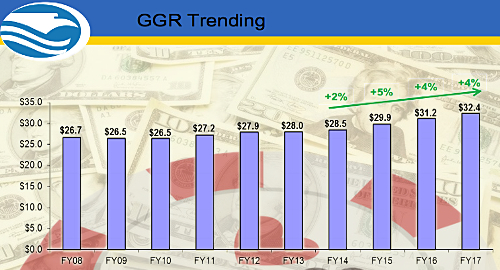 US tribal gaming operators reported revenue rising nearly 4% in their most recent fiscal year, pushing the sector to yet another record result.
US tribal gaming operators reported revenue rising nearly 4% in their most recent fiscal year, pushing the sector to yet another record result.
Figures released Tuesday by the National Indian Gaming Commission (NIGC) show that the 494 gaming venues operated by 242 federally recognized tribes generated gross gaming revenue of $32.4b in fiscal 2017, 3.9% higher than the fiscal 2016 result, which featured 10 fewer gaming venues.
The FY17 sum marks the seventh consecutive year of annual growth after flatlining at $26.5b in 2010. There were 33 venues earning over $250m in FY17, unchanged from FY16, while the number of venues earning between $100m and $250m rose by five to 56.
The 74 tribal casinos in the Sacramento region (California and Northern Nevada) claimed the largest slice of FY17 revenue at just under $9b, followed by $7.3b generated by the 37 venues in the Washington DC category (Alabama, Connecticut, Florida, Louisiana, Mississippi, North Carolina and New York).
The Sacramento region also claimed the largest year-on-year gain in percentage terms (7.3%), followed by the Portland region (Alaska, Idaho, Oregon and Washington), which grew by 6.5%. The Rapid City region (the Dakotas, Montana and Wyoming) was the only one on a negative revenue trajectory, falling 2.7% from FY16.
2018 marks the 30th anniversary of the Indian Gaming Regulatory Act (IGRA), and NIGC chair Jonodev O. Chaudhuri said the success of the tribal gaming sector over that span proves that “the foundational principles of federal Indian law should remain at the forefront of any future public policy discussions.”
Future annual reports will likely get a shot in the arm from sports betting, an activity that the NIGC fully intends to incorporate into the tribal gaming mix. Following the US Supreme Court ruling in May that struck down the federal betting ban, the NIGC issued a statement noting that tribes should be given “a seat at the table to voice their positions, bring their perspectives and collective expertise, and maintain regulatory and operational control over all the gaming that occurs on their lands.”